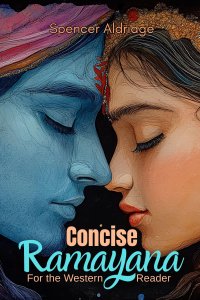There are stories that shimmer like distant stars, forever out of reach, and there are stories that walk beside us, breathing the same air, whispering into our dreams. The Ramayana is one of those living stories. It is a vast, golden river of myth, history, and wonder that has flowed through the soul of India for millennia – soaring, tumbling, glittering – and now, at last, it seeks a new shore.
Concise Ramayana for the Western Reader is not an academic text or a dusty translation; it is an invitation. It is a bridge across oceans of culture and time, bringing Rama?s ancient tale into sharp, clear focus for those who may be meeting it for the first time – or for those who wish to hear it told anew, stripped of unnecessary ornament but retaining all its shimmering, essential heart.
At its core, The Ramayana is the story of a promise. Rama, a prince destined for greatness, is cast out of his rightful throne and thrust into a world of exile, betrayal, devotion, and war. He walks through forests dense with spirits and monsters, faces allies and enemies who are never quite what they seem, and carries upon his shoulders the enormous, terrible weight of dharma – the sacred duty to do what is right, even when the cost is almost unbearable.
Beside him is Sita, a woman whose strength is not loud but unbreakable, whose dignity is a blade sharper than any warrior?s sword. Alongside Rama strides Lakshmana, fierce and loyal, and Hanuman, the joyous and unstoppable spirit of faith and friendship who leaps across oceans to serve love itself.
You will find in these pages all the mighty battles, the dazzling miracles, and the heroic journeys that myth lovers adore. But more importantly, you will find the ache beneath them: the cost of honor, the loneliness of leadership, the sorrow of choices no one should have to make.
This telling does not aim to be exhaustive. Instead, it seeks to be true – true to the heartbeat of the Ramayana, to its wild beauty and its quiet wisdom. I have shaped it for readers who know nothing yet of Hindu mythology, who do not need prior knowledge of gods and demons, of dharma and karma, but who understand what it means to yearn, to love, to lose, and to hope.
In the end, the Ramayana is not a foreign story at all.
It is a human one.
It is the story of what it means to try and be good in a world where goodness alone is not enough to protect you. It is the story of how we are shaped by what we lose – and how, sometimes, we can still shape the world in return.
If you have never read the Ramayana before, begin here.
If you have heard its music from afar but never dared step closer, welcome.
And if you already know its melodies, then I invite you to hear them sung in a slightly different key – a key tuned for the heart that is curious, open, and willing to follow a golden deer into a forest where stories are born.
Step into the Ramayana.
It has been waiting for you.
Twin Souls (Nevermore, Book 1) - A Vampire Hunter Novel
Santa Fe Mail Order Brides: John Blessed by Love
When You Got A Good Thing: A Small Town Family Romance (The Misfit Inn Book 1)
Reviews:
No reviews yet.
Third Party Reviews:
No reviews yet. Why not link one?
You can suggest a blog review here
<< Next post in Archived Books
Previous post in Archived Books >>
2025-05-14




